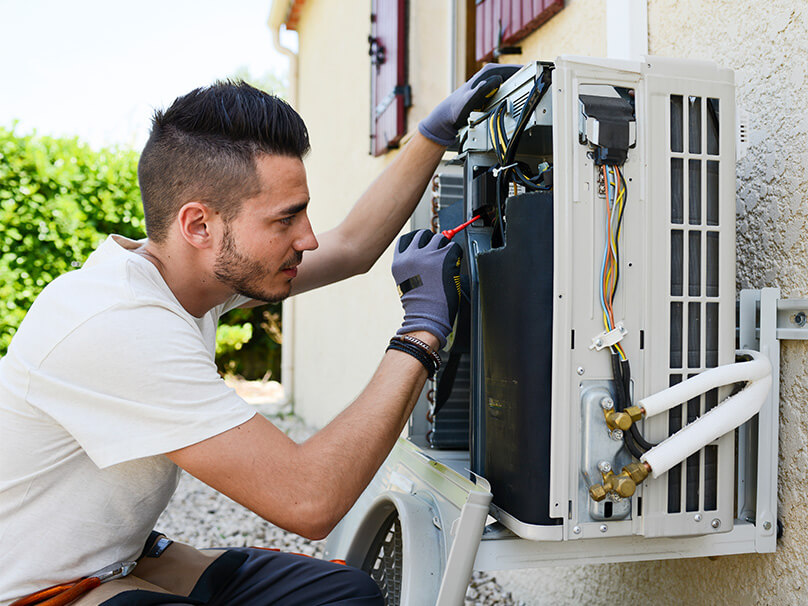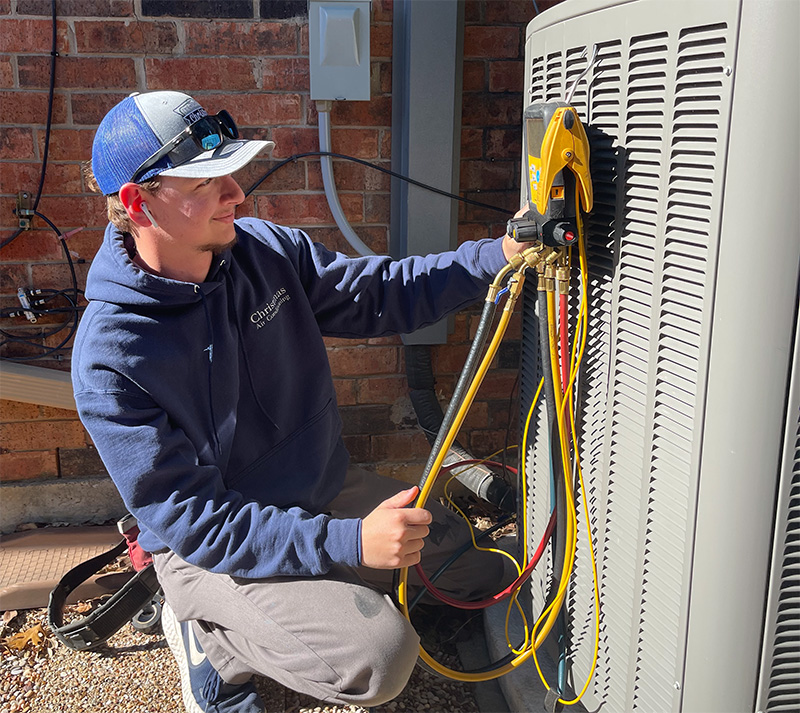Examine This Report on Fix Air Conditioner
Examine This Report on Fix Air Conditioner
Blog Article
Facts About Air Conditioner Repair Near Me Uncovered
Repair Air Conditioner Near Me: Expert Cooling System Restoration Guarantees Your Home Remains Comfortable All Year Round
Kinds Of Air Conditioning Systems
When tackling air conditioner repair work, comprehending the kind of a/c system you're handling can save time, money, and aggravation. Ever questioned why some systems cool a space quicker than others? Or why certain systems seem to break down more frequently? Let's peel back the layers.
Central Air Conditioning
Some Ideas on Air Conditioning Repair You Need To Know
Imagine a cool breeze streaming through an entire house, whispering convenience into every corner. Central air systems do exactly that. They use a network of ducts to disperse cooled air, depending on a compressor and condenser outside, paired with an evaporator coil inside. When this complex monster falters, identifying the problem can be like finding a needle in a haystack.
Split Systems

Split systems are a popular choice for lots of homes-- part indoor system, part outside compressor. They use flexibility and performance, but their dual nature suggests repair work can involve either component. Have you ever heard an unusual sound outside your home just to discover the indoor unit isn't cooling? That's a classic sign of a split system glitch.
Not known Incorrect Statements About Fix Air Conditioner
Window Units
These compact warriors battle summer heat by fitting comfortably into a window frame. They combine all components into a single box. Their simplicity frequently suggests less repair headaches, but ignoring filters or enabling particles accumulation can lead to diminished efficiency or breakdowns.
Ductless Mini-Splits
7 Simple Techniques For Fix Air Conditioner
Ductless systems bypass ductwork totally, making them ideal for homes without existing ventilation. They're quiet, efficient, and surprisingly resilient. When repair work are required, specialists should be proficient at managing refrigerant lines and electrical connections-- no little feat.
Quick Recommendation Table
| Type | Key Includes | Common Repair Issues |
|---|---|---|
| Central air conditioning | Ductwork, whole-house cooling | Duct leaks, compressor failure |
| Split System | Indoor & & outdoor systems | Refrigerant leaks, fan motor concerns |
| Window System | All-in-one, simple installation | Filthy filters, electrical faults |
| Ductless Mini-Split | No ducts, zoned cooling | Line leaks, sensor malfunctions |
Fix Air Conditioner Things To Know Before You Buy
Deciphering the Many Regular Air Conditioning Problems
Have you ever wondered why your a/c unit suddenly stops cooling throughout a sweltering afternoon? One common perpetrator is a filthy or blocked air filter. This sneaky villain restricts airflow, forcing your system to work overtime, which not only minimizes performance but can also result in premature breakdowns. Think of attempting to breathe through a headscarf taken in dust-- it's exhausting!
Another frequent misstep is refrigerant leaks. These undetectable leakages don't just decrease cooling power however can likewise harm the compressor, the heart of your a/c system. How often do you look for uncommon hissing noises or ice formation on the coils? Catching these signs early can conserve you from expensive repair work down the line.
Beyond the Fundamentals: Lesser-Known Issues
Everything about Air Conditioner Repair Near Me
Often, the thermostat itself is the troublemaker. Miscalibrated or malfunctioning thermostats send out mixed signals, triggering the AC to cycle erratically. Ever skilled your AC switching on and off in fast succession? That's called brief biking, a sly efficiency click here drainer that can wear out components much faster than you 'd expect.
Electrical problems, such as used wiring or a malfunctioning capacitor, might prowl underneath the surface. Air Conditioning Repair. These frequently manifest as a/c systems stopping working to begin or all of a sudden shutting down. A professional eye knows to evaluate these elements with precision tools, something a casual look won't expose
Professional Tips for Diagnosing Common AC Problems
Some Known Factual Statements About Ac Repair Near Me
- Check and change air filters frequently-- every 1 to 3 months depending upon usage and environment.
- Listen for unusual sounds like rattling or buzzing that might signify loose parts or electrical faults.
- Inspect the outside unit for debris or obstructions that hinder air flow and cause getting too hot.
- Try to find frost buildup on evaporator coils, a tip towards refrigerant problems or air flow restrictions.
- Test the thermostat settings and recalibrate if the temperature level readings feel off.
Quick Recommendation Table: Manifestation & & Probable Causes

| Sign | Probable Cause | Expert Suggestion |
|---|---|---|
| Warm air blowing | Low refrigerant or dirty coils | Tidy coils and look for leaks instantly |
| Short biking | Thermostat problems or extra-large unit | Change thermostat settings and consult sizing guidelines |
| System will not begin | Electrical faults or capacitor failure | Test electrical wiring and replace capacitors as required |
| Water leak | Clogged drain line or frozen evaporator | Clear drain lines and examine for coil icing |
DIY Air Conditioning Upkeep Tips
Ac Repair Can Be Fun For Everyone
Ever seen your a/c unit sputtering like an old engine on a hot summertime day? Ignoring subtle indications typically suggests more than just a sweaty afternoon-- it's a prelude to unexpected air conditioner repair work costs. What if you could catch those whispers before they turn into wails? Routine do it yourself maintenance can be your first line of defense.
Simple Actions to Keep Your Air Conditioning Running Smoothly
The Single Strategy To Use For Ac Fixing
- Clean or Replace Filters: A blocked filter resembles trying to breathe through a headscarf. Every 1-3 months, check and swap out your filters. It improves airflow and effectiveness, avoiding compressor strain.
- Examine the Condenser Coils: Dust and debris serve as unnoticeable blankets smothering your system's cooling power. Gently brush or vacuum the coils, however prevent severe chemicals that may wear down the metal.
- Inspect the Drain Line: When was the last time you looked at your drain pan? A clogged drain can cause water leaks and foster mold development. Flushing it with a vinegar service month-to-month keeps the flow clear.
- Seal and Insulate: Are your ductworks whispering leaks? Sealing gaps with mastic or foil tape boosts performance and reduce uneven cooling.
Pro Tips Beyond the Basics
- Procedure your unit's voltage to catch subtle electrical wear before it sparks huge issues.
- Listen for unusual hums or rattles-- these acoustic breadcrumbs frequently indicate loose parts or stopping working motors.
- Keep outside units shaded but make sure at least 2 feet of clearance around them for optimum airflow.
Ask yourself: Are you hearing your a/c's peaceful SOS or just waiting for it to yell? Taking time for DIY a/c upkeep changes reactive repair work into proactive care, conserving sweat, tension, and yes, money.
All about Air Conditioner Repair Near Me
Why Expertise in A/c Repair Work Matters
Picture this: your AC system sputters and groans throughout a scorching afternoon, leaving you sweltering inside your home. Would you rely on a beginner fumbling with delicate components, or would you look for the peace of mind of a professional AC specialist!.?.!? The complexities of contemporary air conditioning systems require precision and experience. A slight mistake can intensify a small breakdown into an expensive catastrophe.
How Repair Air Conditioner Near Me can Save You Time, Stress, and Money.
Hidden Intricacies Behind the Cool Breeze
Many underestimate the layers concealed below the streamlined exterior of an AC unit - AC Air Conditioner Repair. From refrigerant leaks that silently drain performance to faulty thermostats that misread temperatures, these issues require more than a fundamental toolkit. Professionals have a keen eye for detecting problems that average property owners neglect
Essential Tips for Choosing the Right Professional
The Only Guide to Repair Air Conditioner Near Me
- Accreditation and Training: Confirm qualifications; a service technician trained in the current heating and cooling technologies is invaluable.
- Experience with Particular Systems: Not all AC units are developed equal; find somebody knowledgeable about your model's peculiarities.
- Diagnostic Method: Competent professionals use sophisticated tools-- like electronic leakage detectors and thermal imaging-- to identify covert faults.
What to Anticipate from a Pro's Diagnostic Process
| Step | Purpose | Professional Insight |
|---|---|---|
| Visual Evaluation | Determine apparent wear or damage | Look for rust or uncommon sounds-- an indication frequently overlooked |
| Pressure Checking | Find refrigerant leakages | Subtle pressure drops can hint at micro leakages undetectable to the naked eye |
| Electrical Evaluating | Ensure circuit integrity | Loose connections can imitate extreme mechanical failures |
A Biased View of Ac Repair Near Me
Why DIY Frequently Falls Short
Appealing as it is to tinker with your air conditioning system, DIY repairs regularly miss out on the root cause. For example, complementing refrigerant might momentarily cool your space however ignores leaks that worsen gradually. Professional professionals don't simply spot symptoms; they pursue the underlying mechanical and electrical faults that sap efficiency.
Air Conditioning Repair Near Me for Beginners
Concerns to Ask Before Employing
- What diagnostic tools do you use to determine issues?
- Can you discuss the repair work procedure and expected outcomes?
- Are you familiar with the refrigerants compatible with my unit?
- Do you follow safety protocols for managing electrical components?